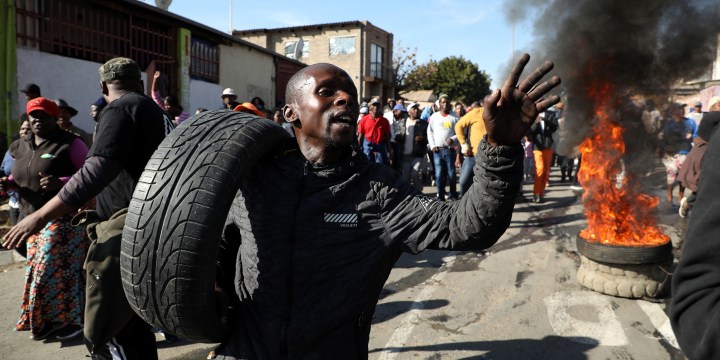OP-ED
Violence begets violence, and poverty creates structural violence

It is important to understand that the absence of basic services is a form of violence and a systematic failure of the state. Protest action in response, whether peaceful or violent, should not be surprising.
Statistics South Africa reports that around 49.2% of the adult population live below the upper-bound poverty line (R 1,183 per person per month for food and non-food items). This, alongside the fact that South Africa is one of the most unequal countries in the world, reveals that structural violence is entrenched in the social fabric of the country. The response to this structural violence is manifold, but one consistent response has been a protest action.
Johan Galtung coined the term “structural violence” in 1969 to refer to any harm enforced by social structures or institutions that create environments for some people to experience impairment that can be avoided. Structural violence moreover limits people’s access to basic needs. These basic needs include, but are not limited to, access to safe and decent housing, water, electricity, sanitation, education and safety. Not having access to these basic services is not only potentially deadly but its absence also creates an environment where people continue to be dehumanised.
To show the dehumanising effect of structural violence, I’d like to share the story of a woman who lived in the same informal settlement as I, Madelakufa informal settlement in Tembisa, in the early 1990s. Madelakufa, like many informal settlements around South Africa, was infamous for fires. The lack of electrification meant that accidental fires, some deadly, occurred frequently. This woman, whose real name got lost in the dehumanising, everyday lived experience of life in Madelakufa, was often the first to alert the community to a fire. She would run around the settlement shouting “wash’umkhukhu” as an attempt to get the community to rally behind her with their buckets to stop the fire. This continued for years and years until her real name slowly got washed away and was replaced with “Wash’umkhukhu”.
The fact that an individual’s lack of access to adequate and safe living conditions can be so persistent, and can go unaddressed for so long as to become a defining characteristic of that individual’s being, shows the extent to which structural violence intertwines with our everyday experiences.
Wash’umkhukhu is not the only person in South Africa who experienced and continues to experience the dehumanisation of poverty and the harms of structural violence in her everyday life. In fact, this is a shared experience for many poor people living in South Africa.
Structural violence does not only prevent people from accessing their basic needs, but it is also deeply psychological. This is because we live in a largely capitalist society that too often denies systematic privilege and oppression and instead blames the poor for their poverty.
This framing is dangerous because it often results in the physical performance of violence. This often manifests in the state’s continued non-delivery of services and its response to service delivery protests.
When society and the state fail to see, acknowledge or appreciate the structural violence communities confront daily, it’s easier for the state to dismiss calls for change. It also allows the state to shift the focus from the demands being articulated through service delivery protests to critiques of how poor communities protest instead.
Peaceful protests are erroneously labelled “illegal”. Demands for dignity and basic services are labelled unreasonable. Peaceful actions are negatively labelled disruptive – as if the purpose of protest action by definition isn’t to disrupt the status quo. These labels inform the response by law enforcement bodies to protest actions, which is often heavy-handed.
Similarly, when protesters are violent, the state uses this violence to do one of two things. First, it uses the violence to detract from the structural violence, carried by communities, that it has failed to address. The second: it responds, it prioritises the delivery of service to the community, which inadvertently instigates similar future violence. All levels of government often ignore peaceful calls for services until there is an escalation of violence in those communities.
It is important to understand that the absence of basic services is a form of violence and a systematic failure of the state. Protest action in response, whether peaceful or violent, should not be surprising.
This is not an endorsement of the violence meted out by either protesters or law enforcement in some service delivery protests, but rather a call to understand why service delivery protests often end in violence. It is an invitation to reflect deeply on the role the state has played in creating the conditions for that violence. DM
Ntebaleng Morake is education co-ordinator at the Social Justice Coalition.


















 Become an Insider
Become an Insider